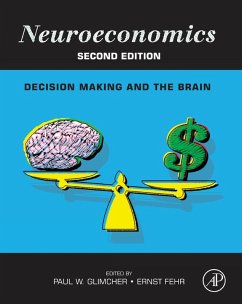- Editors and contributing authors are among the acknowledged experts and founders in the field, making this the authoritative reference for neuroeconomics
- Suitable as an advanced undergraduate or graduate textbook as well as a thorough reference for active researchers
- Introductory chapters on economics, psychology, neuroscience, and anthropology provide students and scholars from any discipline with the keys to understanding this interdisciplinary field
- Detailed chapters on subjects that include reinforcement learning, risk, inter-temporal choice, drift-diffusion models, game theory, and prospect theory make this an invaluable reference
- Published in association with the Society for Neuroeconomics-www.neuroeconomics.org
- Full-color presentation throughout with numerous carefully selected illustrations to highlight key concepts
Dieser Download kann aus rechtlichen Gründen nur mit Rechnungsadresse in A, B, BG, CY, CZ, D, DK, EW, E, FIN, F, GR, HR, H, IRL, I, LT, L, LR, M, NL, PL, P, R, S, SLO, SK ausgeliefert werden.
"This book describes neuroeconomics, a combination of neuroscience and behavioral economics, with the goal of understanding how economic policies influence motivation on a neuropsychological level and, ultimately, behavior.This is an excellent book.It should be in the libraries of students and professionals interested in neuroeconomics."Rating: 4 Stars --Doody.com, April 4, 2014
Reviews for the First Edition:
"Neuroeconomics is a timely collection of papers by leading researchers from both sides of the border between economics and neuroscience.The book should be of interest to anyone who has ever wondered about the mechanics of how decisions are made in the brain, and what it means about human nature." --VINCE CRAWFORD, DISTINGUISHED PROFESSOR OF ECONOMICS, UNIVERSITY OF CALIFORNIA, SAN DIEGO, USA
"Economists pride themselves on rigorous parsimony. By taking the neural correlates of behavior into account, potentially explanatory variables explode. This book shows when digging deeper nonetheless pays for economics, and how to do it well." --CHRISTOPH ENGEL, EXECUTIVE DIRECTOR, MAX PLANCK INSTITUTE FOR RESEARCH ON COLLECTIVE GOODS, BONN, GERMANY
"For those onlookers who can't quite accept that neuroscience may provide insight into how we decide what course of action to follow, the contributors to this comprehensive volume offer some very compelling, and very serious experimental and theoretical insights. Highly recommended, and enormously provocative." --FLOYD BLOOM, PROFESSOR EMERITUS, DEPARTMENT OF NEUROPHARMACOLOGY, THE SCRIPPS RESEARCH INSTITUTE, LA JOLLA, USA









